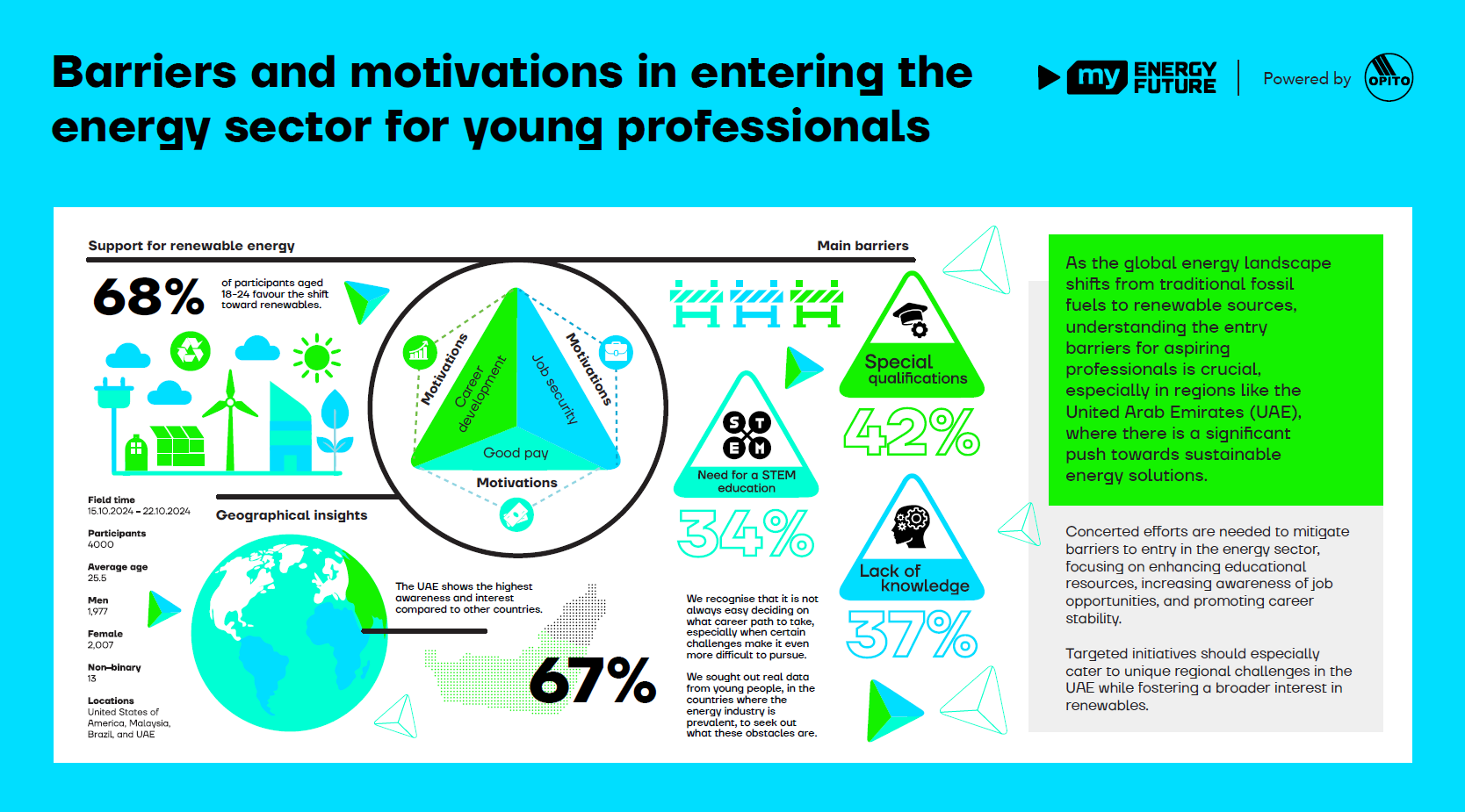74% of young people across key international energy markets would consider a career in the energy sector but highlight the perceived requirement for technical qualifications and lack of understanding of opportunities as preventative.
With talent acquisition continuing to be an industry challenge, the global research project ‘Energy Sector Entry and the Perceived Barriers’ was commissioned by OPITO, the global skills authority for the energy industry, who for over half a century have been committed to developing a safe, skilled and competent energy workforce both now and in the future. The not-for-profit organisation has published the full results in an exclusive report highlighting the research undertaken in major global energy hubs; the United Arab Emirates, Malaysia, Brazil and USA, to better understand young people’s perceived barriers to entering the energy sector.
The report findings clearly identify young people’s perceived barriers to joining the sector as: the requirement for specialist industry qualifications and certifications; a lack of knowledge about the industry and the opportunities it offers; and a requirement to have a STEM-based education. To see the findings in more detail, please download our report here: My Energy Future – Industry Research – OPITO
Key findings:
- 45% of respondents indicated a high level of familiarity with employment opportunities in the energy sector
- 42% saw a need for special qualifications or certifications as the most significant barrier to entry
- 52% were most encouraged to consider energy careers due to good pay
In the last decade, the energy sector has been faced with a skills deficit on a global level, with international recruitment agencies such as Adecco identifying the core reasons as: an ageing workforce; technological advancements that many upskilling programmes can’t keep up with; and a lack of awareness for the opportunities the sector has to offer.
It is hoped that the data collected from this research will support companies globally to identify opportunities to engage more effectively with young people and develop the sector’s future workforce, by showcasing the wide range of opportunities available, engaging at a younger age and informing students of STEM qualifications needed for the sector. The data highlights many commonalities across the globe; it’s clear that young people are drawn to the sector by job stability and competitive pay but concerns around a perceived lack of technical qualifications and limited understanding of the industry are significant barriers in attracting new talent to the industry.
Stephen Marcos Jones, OPITO Chief Executive Officer, commented “OPITO work globally supporting workforce development and we are seeing first-hand the struggles to recruit at all levels across the energy mix. As nations across the globe look to meet ambitious climate targets, the need for a diverse and sustainable energy mix is more pressing than ever. We must ensure that relevant skills across more mature sectors are applied properly to emerging areas, and that the workforce can see tangible and realistic pathways put in place for them. Additionally, in terms of raw numbers, human capital is our most precious asset; these complex, multi-phase projects that we need to build a secure energy future will not happen without the right workers in the right numbers. That is why appealing to the younger generations, and modernising attraction practices, is also core to success.
“In commissioning this research, we have gained valuable insights into the barriers young people identify, particularly around technical qualifications and limited sector knowledge. Both collaboratively as an industry and at a localised recruitment level we can use this information to work with project and industry partners to break down these barriers and drive young people towards careers in the energy sector.”
Alex Spencer, OPITO Chief Operating Officer, said “We are proud to invest significantly in global STEM initiatives through My Energy Future powered by OPITO, which aims to inspire and attract young talent to the energy workforce. Understanding this data and being able to share it with the industry to demonstrate awareness of the challenges in attracting new talent into the industry, is a vital next step for OPITO in supporting the sector to adapt its approach and develop innovative recruitment strategies.”
“OPITO have a deep-rooted commitment to building the provisions necessary to bridge the skills gap within the energy industry. This research makes it clear that we must provide the correct tools to allow young people to fulfil their ambition for energy careers. Through global initiatives like My Energy Future, OPITO’s Energy Transition Qualifications and by working closely with governments and industry leaders, we remain committed to making sure that individuals are equipped with the skills they need to support the demands of the energy transition both now and in the future.”
A new approach looking to build innovative apprenticeship pathways alongside other upskilling and on-the-job training programmes must be considered in conjunction with more traditional education pathways. A real driver to modernise these systems currently is a focus on meta-skills, which equip young people with crucial skills that can be applied in a number of contexts. This, coupled with innovation is allowing employers more flexibility in terms of what training they can fund, resulting in shorter-term programmes, as well as apprenticeships, receiving the appropriate attention and credence they deserve.
My Energy Future are continuing their sponsorship of the Young ADIPEC zone this year, launching their new VR experience that showcases the energy mix through a variety of traditional, clean and renewable energy sources. The interactive experience sees users explore various assets and answer questions about the energy transition, while exploring the opportunities the transition has to offer.
In addition, OPITO Chief Executive Officer, Stephen Marcos Jones is taking part in a podcast interview hosted in the Young ADIPEC zone where he’ll be discussing the development of skills and technology for a sustainable energy future and the report findings in more depth. Other podcast panellists include senior representatives from ADNOC Technical Academy and Saudi Arabia Drilling Academy.

